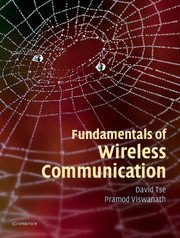Crossref Citations
This Book has been
cited by the following publications. This list is generated based on data provided by Crossref.
Ritcey, J.A.
2005.
A Universal Asymptotic Series for Error Rates over Fading Channels.
p.
1584.
Kiran, T.
and
Rajan, B.S.
2005.
STBC-Schemes With Nonvanishing Determinant for Certain Number of Transmit Antennas.
IEEE Transactions on Information Theory,
Vol. 51,
Issue. 8,
p.
2984.
Diggavi, S.N.
and
Tse, D.N.C.
2005.
Fundamental limits of diversity-embedded codes over fading channels.
p.
510.
Friedlander, B.
2005.
Using MIMO to Increase the Range of Wireless Systems.
p.
1404.
Takahashi, C.
Celik, N.
Rezk, M.
Demirkol, M.F.
Yun, Z.
and
Iskander, M.F.
2005.
Integration of propagation modeling in simulation of CDMA communication systems.
Vol. 1A,
Issue. ,
p.
795.
Nan Zhang
and
Vojcic, B.
2005.
Evaluating the temporal correlation of MIMO channel capacities.
p.
5 pp..
Hoven, N.
and
Sahai, A.
2005.
Power Scaling for Cognitive Radio.
Vol. 1,
Issue. ,
p.
250.
Li, Zhu
Cheng, Alan
Katsaggelos, Aggelos
and
Ishtiaq, Faisal
2005.
Video Summarization and Transmission Power Adaptation for Very Low Bit Rate Multiuser Wireless Uplink Video Communication.
p.
1.
Lozano, A.
Tulino, A.M.
and
Verdu, S.
2005.
High-SNR Power Offset in Multiantenna Communication.
IEEE Transactions on Information Theory,
Vol. 51,
Issue. 12,
p.
4134.
Thomas, J.
2005.
Cross-Layer Scheduling and Routing for Unstructured and Quasi-Structured Wireless Networks.
p.
1.
Ergen, S.C.
and
Varaiya, P.
2005.
On multi-hop routing for energy efficiency.
IEEE Communications Letters,
Vol. 9,
Issue. 10,
p.
880.
Babadi, Behtash
Shariatpanahi, Pooya
and
Khalaj, Babak Hossein
2005.
An adaptive feedback bit allocation method for wireless systems with transmit diversity.
p.
181.
Sevgi, L.
2005.
Computational Electromagnedes for RIF and Microwave Engineering [Book Review.
IEEE Antennas and Propagation Magazine,
Vol. 47,
Issue. 4,
p.
101.
Sanayei, S.
and
Nosratinia, A.
2005.
Opportunistic Beamforming with Limited Feedback.
p.
648.
Radovic, D.S.
and
Eric, M.M.
2005.
Performance of Subspace Based Multi-user CFO Estimation for Interleaved OFDMA Uplink.
p.
1602.
Ghasemi, A.
and
Sousa, E.S.
2005.
An em-based subspace tracker for wireless communication applications.
Vol. 3,
Issue. ,
p.
1787.
Leong, A.S.C.
Evans, J.S.
and
Dey, S.
2005.
Power Control and Multiuser Diversity in Multiple Access Channels with Two Time-Scale Fading.
p.
86.
Yi Jiang
Li, Jian
and
Hager, W.W.
2005.
Uniform channel decomposition for MIMO communications.
IEEE Transactions on Signal Processing,
Vol. 53,
Issue. 11,
p.
4283.
2005.
Coding for Wireless Channels.
p.
301.
Kiran, T.
and
Sundar Rajan, B.
2005.
STBC-schemes with non-vanishing determinant for certain number of transmit antennas.
p.
1178.



